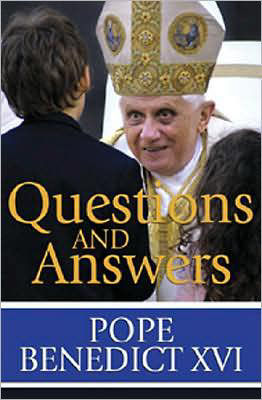
|
Posted April 14, 2008
Book: Questions and Answers Author: Pope Benedict XVI Our Sunday Visitor. Huntington, IN. 2008. Pp. 175 An Excerpt from the Jacket:
An Excerpt from the Book: I am Fr. Mauro, Your Holiness. In exercising our pastoral ministry, we are increasingly burdened by many duties. Our tasks in the management and administration of parishes, pastoral organization and assistance to people in difficulty are piling up. I ask you, what are the priorities we should aim for in our ministry as priests and parish priests t avoid fragmentation on the one hand and on the other, dispersion? Thanks you. That is a very realistic question, is it not? I am also somewhat familiar with this problem, with all the daily procedures, with all the necessary audiences, with all that there is to do. Yet, it is necessary to determine the right priorities and not to forget the essential: the proclamation of the Kingdom of God. On hearing your question, I remembered the Gospel of the mission of the 70 disciples. For this first important mission that Jesus had them undertake, the Lord gave them three orders that on the whole I think express the great priorities in the work of a disciple of Christ, a priest, in our day too. The three imperatives are to pray, to provide care, to preach. I think we should find the balance between these three basic imperatives and keep them ever present as the heart of our work. Prayer: Which is to say, without a personal relationship with God, nothing else can function, for we cannot truly bring God, the divine reality or true human life to people unless we ourselves live them in a deep, true relationship of friendship with God in Jesus Christ. Hence, the daily celebration of the Holy Eucharist is a fundamental encounter where the Lord speaks to me and I speak to the Lord who gives himself through my hands. Without the prayer of the Hours, in which we join in the great prayer of the entire People of God beginning with the Psalms of the ancient people who are renewed in the faith of the Church, and without personal prayer, we cannot be good priests for we would lose the essence of our ministry. The first imperative is to be a man of God, in the sense of a man in friendship with Christ and with his saints. Then comes the second command. Jesus said: Tend the sick, seek those wh have strayed, those who are in need. This is the Church’s love for the marginalized and the suffering. Rich people can also be inwardly marginalized and suffering. “To take care of” refers to all human needs, which are always profoundly oriented to God. Thus, as has been said, it is necessary for us to know our sheep, to be on good terms with the people entrusted to us, to have human contact, and not to lose our humanity, because God was made man and consequently strengthened all dimensions of our being as humans. However, as I said, the human and the divine always go hand in hand. To my mind, the sacramental ministry is also part of this “tending” in its multiple forms. The ministry of Reconciliation is an act of extraordinary caring that the person needs in order to be perfectly healthy. Thus, this sacramental care begins with Baptism, which is the fundamental renewal of our life, and extends to the Sacrament of Reconciliation and Anointing of the Sick. Of course, all the other sacraments and also the Eucharist involve great care for souls. We have to care for people but above all — this is our mandate — for their souls. We must think of the many illnesses and moral and spiritual needs that exist today and that we must face, guiding people to the encounter with Christ in the sacrament, helping them to discover prayer and meditation, being silently recollected in church with this presence of God. And then, preaching. What do we preach? We proclaim the Kingdom of God. But the Kingdom of God is not a distant utopia in a better world that may be achieved in 50 years’ time, or who know when. The Kingdom of God is God Himself, God close to us who became very close in Christ. This is the Kingdom of God: God himself is near to us and we must draw close to this God who is close for he was made man, remains man, and is always with us in his Word, in the Most Holy Eucharist, and in all believers. Therefore, proclaiming the Kingdom of God means speaking of God today, making present God’s words, the Gospel that is God’s presence and, of course, making present the God who made himself present in the Holy Eucharist. By interweaving these three priorities and, naturally, taking into account all the human aspects, including our own limitations that we must recognize, we can properly fulfill our priesthood. This humility that recognizes the limitations of our own strength is important as well. All that we cannot do, the Lord must do. And there is also the ability to delegate and to collaborate. All this must always go with the fundamental imperatives of praying, tending, and preaching. Table of Contents: 1. Questions asked by children 2. Questions asked by priests of the diocese of Rome 3. Questions asked by the youth of Rome 4. Questions asked by priests of the diocese of Albano 5. Questions asked by priests of the diocese of Rome 6. Questions asked by priests of the dioceses of Belluno-Feltre and Treviso 7. Questions asked by the youth of Italy |
|
